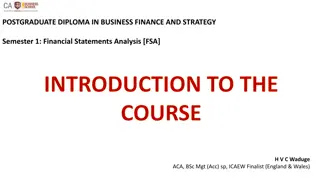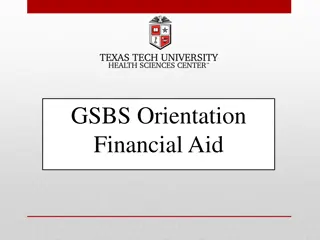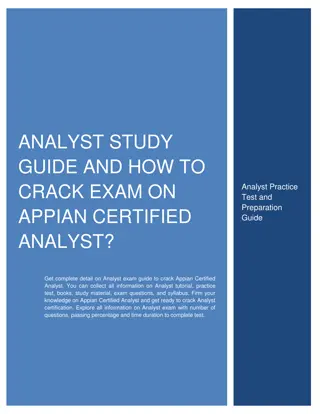What to Expect from Certified Financial Analyst Training
Certified Financial Analyst (CFA) certification is quite a tricky yet a lucrative path to financial, investment, and portfolio management competence.n
Uploaded on Aug 30, 2024 | 2 Views
Download Presentation

Please find below an Image/Link to download the presentation.
The content on the website is provided AS IS for your information and personal use only. It may not be sold, licensed, or shared on other websites without obtaining consent from the author.If you encounter any issues during the download, it is possible that the publisher has removed the file from their server.
You are allowed to download the files provided on this website for personal or commercial use, subject to the condition that they are used lawfully. All files are the property of their respective owners.
The content on the website is provided AS IS for your information and personal use only. It may not be sold, licensed, or shared on other websites without obtaining consent from the author.
E N D
Presentation Transcript
What to Expect from Certified Financial Analyst Training
Introduction: Certified Financial Analyst (CFA) certification is quite a tricky yet a lucrative path to financial, investment, and portfolio management competence. Gaining accreditation as a certified financial analyst can lead to a variety of job options, including investment banking and asset management. However, what precisely can you anticipate from a course leading to certification as a financial analyst? We'll go over the essential elements of CFA training, the topics included in the program, and how it gets you ready for the certified financial analyst test in this blog.
Comprehensive Curriculum Covering Core Finance Areas Training programs for certified financial analysts aim to impart comprehensive knowledge in all areas of finance. Usually, there are three levels in the curriculum, with each level emphasizing a distinct topic: Level I: Emphasizes basic ideas in economics, quantitative techniques, ethics, and financial reporting. Level II: Examines asset valuation, investment instruments, and analysis in greater detail with an emphasis on employing these ideas in practical situations. Level III: Places special emphasis on wealth planning, sophisticated investing techniques, and portfolio management. Candidates are well prepared for every level of the Certified Financial Analyst exam thanks to this systematic method, which guarantees that they have a strong understanding of finance, investments, and ethical norms.
Rigorous Preparation for the CFA Exam A crucial element of training for certified financial analysts is intense preparation for the CFA examination. Training courses are intended to assist applicants in grasping difficult ideas, comprehending the structure of the examination, and creating efficient test-taking techniques. The majority of programs consist of: Mock tests and practice exams: These help students find areas for development by simulating real exam settings. Study Guides & Materials: All-inclusive materials that address every facet of the CFA syllabus. Professional Guidance: Courses or workshops conducted by seasoned financial experts who can provide understanding of challenging subjects and test-taking tactics.
Development of Analytical and Critical Thinking Skills Beyond rote learning, the goal of certified financial analyst training is the development of strong analytical and critical thinking abilities. Candidates are encouraged by the curriculum to evaluate risk, examine financial data, and make wise investment decisions. In the field of finance, where experts are expected to offer precise insights and suggestions, this analytical approach is essential.
Focus on Ethics and Professional Standards A fundamental component of the Certified Financial Analyst credential is ethics and professional standards. Integrity, professionalism, and ethical behavior in the financial industry are highly valued in training programs. This is important since CFAs are required to follow stringent ethical requirements in order to remain credible and trusted in their professions, especially when managing substantial amounts of money.
Networking Opportunities and Career Support Enrolling in a certified financial analyst training program provides beneficial networking opportunities. Through webinars, conferences, and online discussion boards, candidates can network with seasoned pros, business titans, and other hopefuls. Furthermore, several programs offer career support services to help candidates advance in or into the finance profession. These services include resume development, interview prep, and help in job placement.
Flexibility and Accessible Learning Options There are several ways to get certified financial analyst training programs: online, in-person, and self-paced learning modules. Candidates can select the format that best fits their schedule, preferred method of learning, and professional objectives thanks to this flexibility. Working professionals can more easily prepare for the Certified Financial Analyst test with the flexibility of learning at any time and from any place thanks to online training choices.
Conclusion Obtaining a certified financial analyst certification is a major undertaking that calls for commitment, self-control, and careful planning. The goals of certified financial analyst training programs are to give students a thorough understanding of important finance concepts, improve their analytical abilities, and get them ready for the certified financial analyst test. In addition to passing the test, students can acquire the information and abilities required to succeed in a cutthroat financial environment with the correct instruction. Purchasing a top-notch CFA training course is an investment in your career as a financial specialist. Make sure the curriculum you choose fits your learning needs and job goals, whether you go for an online course or an in-person instruction. Ready to start your CFA journey with MindCypress? Enroll in a certified financial analyst exam training today and take the first step toward achieving your career goals!
Slide End and Resource: Resource: https://www.mindcypress.com/blogs/finance- accounting/what-to-expect-from-certified- financial-analyst-training Email: support@mindcypress.com Phone: +1-206-922-2417 +971 50 142 7401























